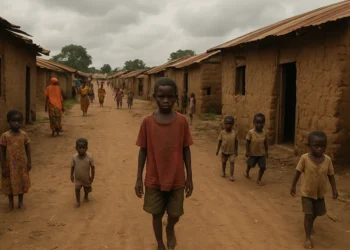The World Bank has warned that the coronavirus outbreak is turning into a major economic crisis and could likely see the emergence of a financial crisis from the pandemic.
This disclosure was made by the World Bank Chief Economist, Carmen Reinhart, during an interview with Bloomberg Television.
Reinhart during the interview said, “This did not start as a financial crisis but it is morphing into a major economic crisis, with very serious financial consequences. There’s a long road ahead.”
READ: World Bank predicts rebound of Sub-Saharan Africa’s economy next year
Reinhart, who assumed her new role in June, is best known for her work with then-Harvard colleague Kenneth Rogoff on the last financial crisis in their 2009 book “This Time Is Different: Eight Centuries of Financial Folly.” It made the pair the go-to resource on the history of government defaults, recessions, bank runs, currency selloffs, and inflationary spikes.
READ: World Bank says remittances to Nigeria, other LMICs will drop by 20% in 2020
When asked whether central banks buying bonds to keep yields low is ultimately a zero-sum game when everyone’s doing it, Reinhart said, “This is a war. During wars, governments finance their war expenditures however they can and right now there are dire needs. The scenario we are in is not a sustainable one.’’
READ: Cryptos: Nigerian financial experts talk risks associated with trading digital assets
The World Bank had said that before the onset of the Covid-19 pandemic, the rising debt levels were already a cause of concern, particularly in many of the world’s poorest countries.
Reinhart’s statement is coming after the G20 countries while responding to a call from the World Bank and the International Monetary Fund (IMF), endorsed the Debt Service Suspension Initiative (DSSI) in April 2020 to help about 73 of the poorest countries manage the impact of the Covid-19 pandemic.
READ: IMF: Global economy is now projected to fall by 4.4%
However, the initiative which is through at least the first half of 2021, falls short of the World Bank’s call for a full-year extension.
China is owed almost 60% of the money that the world’s poorest nations would be due to repay this year, according to World Bank data.
READ: Football: AC Milan announces loss of €195million
The World Bank President, David Malpass, in August, said that China has made many loans to developing countries with terms that aren’t transparent and at higher interest rates than the nations can afford.
READ: COVID-19: IMF Chief predicts $345 billion financing gap in African countries
He had pointed out that the time has come for a much more comprehensive approach to tackling the debt crisis facing the people in the poorest countries, one that involves debt-service suspension as well as broader efforts such as debt-stock reduction and swifter debt-restructuring, grounded in greater debt transparency.
READ: Ruffer ’50 cent’ makes $2.6 billion, as Coronavirus strikes financial market
Asked about China not participating in the debt-suspension relief, Reinhart said the nation was in fact involved, just “less than fully.”
The China Development Bank, a major lender, hasn’t joined the effort, nor have private-sector creditors, she said. “Full participation is something we should strive for but unfortunately haven’t yet seen.”
Explore Data on the Nairametrics Research Website
Use Advanced Financial Calculators on Nairametrics
























In any economy there are different levels of lenders, whose risk tolerance and the risk adjusted loan rates are scaled. World Bank loans carry lower rates, but those loans come with many strings attached. Developing nations that can get WB loans, did. But when those loans are insufficient, they turn to higher rate loans from others, such as China. Those nations are the best judge of what loans they want and can afford. The loans made by Chinese banks are mostly COMMERCIAL in nature, with appropriate pledged security to guarantee the principal and repayments. The Chinese banks bargained for and got the payment secured, fair and square. Why is it the WB’s business?
Spot on Zhuubaajie. I think the more important thing is whether ‘poor countries’ have properly assessed their needs and repayment plans to support the loans taken. No one issues loans with the intent to lose it. It is critical that skilled and experienced hands handle national planning and execution. Anything short of that results in value destruction.